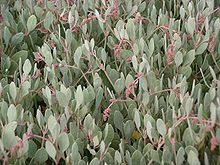Halimione portulacoides, commonly known as sea purslane,[1] is a shrub found in Eurasia.
| Halimione portulacoides | |
|---|---|
 | |
| Scientific classification | |
| Kingdom: | Plantae |
| Clade: | Tracheophytes |
| Clade: | Angiosperms |
| Clade: | Eudicots |
| Order: | Caryophyllales |
| Family: | Amaranthaceae |
| Genus: | Halimione |
| Species: | H. portulacoides |
| Binomial name | |
| Halimione portulacoides | |
Description
The plant grows to 75 centimetres (30 inches) in height. It is evergreen, and in northern temperate climates it flowers from July to September. The flowers are monoecious and are pollinated by wind.
Taxonomy
Botanical synonyms include Atriplex portulacoides L. and Obione portulacoides (L.) Moq. Recent phylogenetic research revealed that Halimione is a distinct genus and cannot be included in Atriplex.[2]
Distribution and habitat
Halimione portulacoides occurs at the sea shores of western and southern Europe, and from the Mediterranean Sea to western Asia.[3] A halophyte, it is found in salt marshes and coastal dunes, and is usually flooded at high tide.
Ireland
Uses
The edible leaves can be eaten raw in salads or cooked as a potherb. They are thick and succulent with a crunchy texture and a natural saltiness.[4] The leaves are good for human and animal health as they contain important micronutrients like zinc, iron, copper, and cobalt.[5]
References
External links
Wikiwand in your browser!
Seamless Wikipedia browsing. On steroids.
Every time you click a link to Wikipedia, Wiktionary or Wikiquote in your browser's search results, it will show the modern Wikiwand interface.
Wikiwand extension is a five stars, simple, with minimum permission required to keep your browsing private, safe and transparent.
